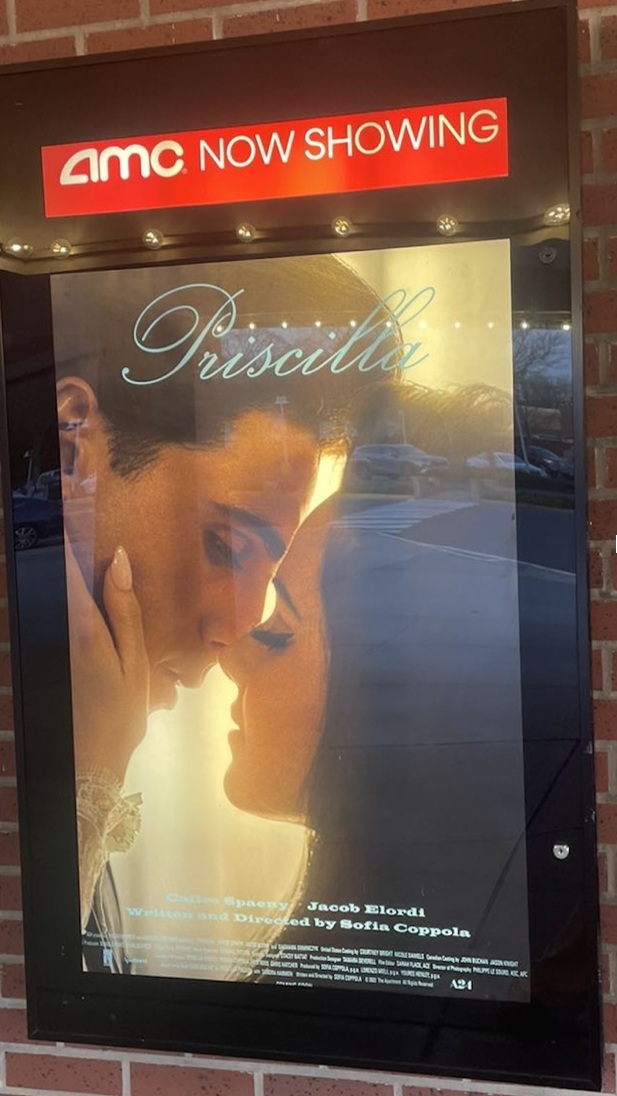At the end of most movies, when the lights flicker back to life in the theater, a usual wave of applause and smiles typically follows. Yet director Sofia Coppola’s last venture, “Priscilla,” elicited a different response from viewers who were confused and ultimately disappointed by an uncommon sight: the credits were rolling right as the climax hit. While some might dismiss this as a cinematic misstep, or as I overheard, “a waste of my money,” I find myself in staunch defense of Coppola’s film. Even with its unconventional and abrupt ending, the film was artfully done.
Based on Priscilla Presley’s book, “Elvis and Me” (1985), the movie dives into a darker aspect of the relationship between ex-wife Priscilla and Elvis, one of Hollywood’s most iconic figures. The main thing you need to know coming into the movie is that this was a weird relationship to say the least. Prescilla was just 14 when, in Germany, she met Elvis, who was 24 at the time. On top of this, they got married in Las Vegas when she was 21 and Elvis was 32. So, the age difference was disturbing, not only from a contemporary perspective, but also from the past perspective, as well..
Coppola’s film provides a juxtaposition from last year’s Elvis movie. It retains the enhancement, but we never see Elvis perform for that long and the movie doesn’t play much of his songs. I would argue that this makes sense; after all the project is supposed to be focused on Priscilla’s narrative, not his. In fact, I believe this film is simply incomparable to last year’s, offering a distinctive perspective that trecends the conventional portrayal of Elvis.
I’m sure those who are big fans of Elvis will call this a vengeful narrative from Coppola, given her previous explorations of femininity and critiques of patriarchal constructs in films like “Marie Antionette”. However, I don’t think this flipped narrative is intended to slander Elvis, but rather serve as proof of the transformative and ultimately dangerous impacts that fame can bring.
And the fact that the real Priscilla Presley acted as an executive producer for the film gives credibility to the story. With that said, I don’t think this flipped narrative is intended to be simply slander towards Elvis, but rather serve as proof of the transformative and ultimately dangerous impacts that fame can bring.
Coming into the movie, I was concerned that Jacob Elordi’s portrayal of Elvis wouldn’t measure up to the praise Austin Butler received for his depiction of the same character in last year’s film “Elvis”. While I will admit that Elordi’s accent got irritating towards the end, the star from the popular show “Euphoria” did much better than I expected.
It’s also worth noting the intentional height difference between the actors of Elvis at 6 ‘5” and Priscilla at 5 ‘1”. The casting choice skillfully highlights Priscilla’s vulnerability that played a pivotal role in their relationship.
My biggest critique of the movie lies in its pacing. The beginning felt far too long, compared to the fast pace in the end. After the two got married, the flow went downhill and as a result, it felt less cohesive and rather just a collection of scene after scene. Perhaps this was done intentionally, a reminder of how everything in Priscilla’s life unraveled in the wake of Elvis’s skyrocketing fame.
Nonetheless, I think the film earns four out of five stars. I would recommend this movie to those seeking a unique perspective on this story, rather than a traditional portrayal of the famous Elvis Presley.




















































